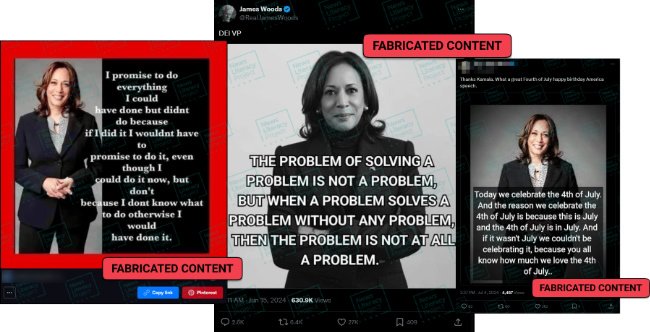The News Literacy Project is tracking trends in presidential election misinformation online. As voting day approaches, let’s take a look at some of them so you can vote based on facts and not lies.
fitness for work
The most common election misinformation is that a candidate is not suitable for the office.
False claims targeting Vice President Kamala Harris make her appear unintelligent or drunk. These falsehoods were spread through a variety of tactics. A short section of her speech was presented out of context. The video of her speaking was slowed down so that her words sounded slurred. Voice actors used to create realistic parodies and quotes made up out of thin air. All presented online as authentic. Be aware that similar claims are made using these tactics.
Former President Donald Trump’s mental acuity has also been the focus of false attacks, with his appearance frequently distorted on social media.
The image on the left was widely circulated among Trump’s critics and the image on the right among his supporters, but neither is an accurate portrayal of Trump. On social media, people can easily get sucked into feeds that offer politically biased views, feeds that feel “right” in a way that resonates with their existing personal biases.
NewsLit Tip: NLP Misinformation Dashboard: The 2024 election contains numerous examples of misinformation with distortions related to candidates’ physical and mental health. These falsehoods tend to reinforce preconceived notions, so if you’ve ever encountered a provocative claim about a candidate and thought to yourself, “Maybe that’s true,” pause for a moment. Re-evaluate your thinking and make sure your opinions on posts are based on accurate information and not political leanings.
question the vote
Most of the claims in the database target the election itself, including falsehoods that seek to cast doubt on the results. These falsehoods rehashed debunked rumors from 2020, presented standard election procedures out of context, and misinterpreted voter registration data. However, the most common fallacy in this category is that noncitizens can vote.
Noncitizens are not legally allowed to vote in presidential elections, and there is no evidence to support these claims of voter fraud.
False claims of election fraud are sure to spread in the days leading up to and after Election Day, November 5, 2024. Make sure you are getting your information from reliable and standard-based sources. Also, if you find shocking claims from personal accounts, check them against standard news reporting.
Want to learn more about the methods we use to collect election-related misinformation? Visit our Misinformation Dashboard and click Where We Get Our Data. You can also contribute: Use this form to submit a false claim that isn’t already on your dashboard.

